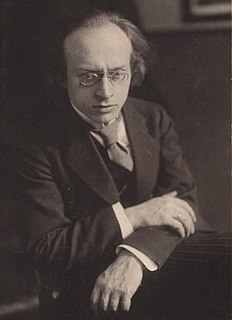A Quote by Max Ernst
The role of the painter . . . is to project that which sees itself in him.
Related Quotes
The artist should paint not only what he sees before him, but also what he sees within him. If, however, he sees nothing within him, then he should also refrain from painting that which he sees before him. Otherwise, his pictures will be like those folding screens behind which one expects to find only the sick or the dead.
A painter tries to convey to us a picture of the world as he sees it; an ophthalmologist tries to enable us to see the world as it really is. The logotherapist's role consists of widening and broadening the visual field of the patient so that the whole spectrum of potential meaning becomes conscious and visible to him.
Like the eye which sees everything in front of it and never sees itself, faith is occupied with the Object upon which it rests and pays no attention to itself at all. While we are looking at God, we do not see ourselves - blessed riddance. The man who has struggled to purify himself and has had nothing but repeated failures will experience real relief when he stops tinkering with his soul and looks away to the perfect One.
Thus we cannot escape the fact that the world we know is constructed in order to see itself. This is indeed amazing. Not so much in view of what it sees, although this may appear fantastic enough, but in respect of the fact that it can see at all. But in order to do so, evidently it must first cut itself up into a least one state which sees, and at least one other state which is seen.
There are two primary ways in which mans relates himself to the world that surround him: manipulation and appreciation . In the first way he sees in what surrounds him things to be handled, forces to be managed, objects to be put to use. In the second way he sees in what surrounds him things to be acknowledged, understood, valued or admired.
Were it not for this [dissatisfaction], the perfect painting might be painted, on the completion of which the painter could retire. It is this great insufficiency that drives him on. The process of creation becomes necessary to the painter perhaps more than it is in the picture. The process is in fact habit-forming.
But the mark of American merit in painting, in sculpture, in poetry, in fiction, in eloquence, seems to be a certain grace withoutgrandeur, and itself not new but derivative; a vase of fair outline, but empty,--which whoso sees, may fill with what wit and character is in him, but which does not, like the charged cloud, overflow with terrible beauty, and emit lightnings on all beholders.
There are two kinds of death, the death which is inevitable and common to all beings, and the death which is voluntary and particular to certain ones of them only. It is the second death which is prescribed for us in the words of the Messenger of Allah: "Die before you die." The resurrection is accomplished for him who dies this voluntary death. His affairs return to God and they are but one. He has returned to God and he sees Him through Him. As the Prophet said - on him be Grace and Peace!






































